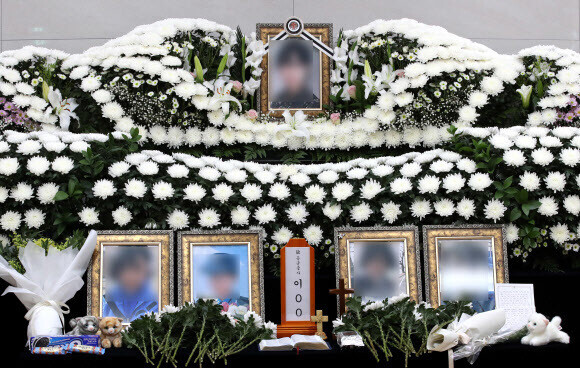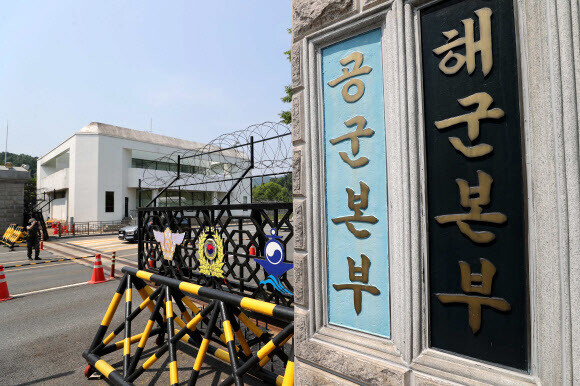hankyoreh
Links to other country sites 다른 나라 사이트 링크
Late Air Force master sergeant’s suicide is not surprising, women in military say

“Can I be honest with you? Female soldiers taking their own lives because of sexual violence is something that happens periodically. I even found myself wondering why this incident was the one that became such a big issue.”
That was how “K,” a former officer in the South Korean army, answered a question about the recent suicide of an Air Force master sergeant surnamed Lee. K isn’t the only one who feels that way.
Six current and former female soldiers who spoke with the Hankyoreh said that the organizational cajoling, shoddy investigation, secondary victimization and isolation revealed in this incident were only too familiar. These six women overcame their hesitation about agreeing to an interview with the press out of the conviction that the time has come for things to change.
Left out of assignments but pampered during meals with senior officersSexual violence takes root when there’s low gender sensitivity. The low level of gender sensitivity in the army, where women only account for 7.4% of soldiers as of 2020, leaves women with few options.
“From the outset, I often didn’t feel like I belonged because I was left out of assignments or meals. [The male soldiers] handled us females with kid gloves. I ended up becoming more outgoing because I didn’t want to be excluded from activities,” K said.
“But that made [the male soldiers] think I was OK with them being more forward and aggressive, and they started doing and saying things that crossed the line.”
Former military officer “N,” said that the military views female soldiers as “flowers” and “decorations.” N further noted that young female soldiers are “appointed” to accompany “high-level officers” during meals when they visit military bases. “They tell [the female soldiers] to sit next to so and so,” the officer said, adding, “Male soldiers who want to get promoted say they get jealous when they see this because [the women] get to have meals with high-level officers.”
Female soldiers express fear of being branded “soldiers of interest” and about their personal information being sharedThere are many reasons why female soldiers avoid reporting sexual assault. One major reason female soldiers fail to report such incidents is because of the fear they will be branded as “soldiers of interest.”
“When a sexual assault report is made, the name, picture and other personal information [of the victim] are shared in group messenger chats, something I have seen several times,” K said. “Even if [the sexual assault report] does not stay on [a female soldier’s] personnel records, people in the know all end up finding out who the victim is.”
N told the Hankyoreh that she remembers an investigator telling her the following after her predecessor left military service: “He came to me to talk about the incident and then said, ‘You need to pretend this never happened.’”
N questioned whether anyone would report being victimized given such circumstances.
Some of those the Hankyoreh interviewed pointed out that the military is not faithfully conducting sexual assault prevention education or ensuring a proper system is in place to prevent victimization.
“Gender equality education is held on a regular basis. However, unqualified instructors try to improve people’s focus on the lecture material by caricaturing situations involving sexual assault, which makes male soldiers who are listening burst out in laughter,” N said.

Another former military officer, “D,” told the Hankyoreh that when a younger female officer reported that a male soldier had hugged her from behind while offering to give her tips on how to write official documents, an official charged with counseling on sexual harassment and assault issues responded by saying, “That type of thing is OK, isn’t it?”
Despite guidelines and systems in place, sexual assault reports can disappear when victims are wooed into rescinding them or are covered up. It all depends on the perceptions of the senior officers involved.
“R,” a non-commissioned officer said, “how much attention commanding officers pay to these incidents decides in what way and how quickly these incidents are dealt with.”
Another former military officer, “M,” said, “there are commanders who believe their burden of command grows heavier with the addition of female soldiers to their ranks, and blame female soldiers for causing issues for the military, even when they are victims of sexual assault.”
Another current officer, “P,” said, “the minute Air Force Master Sergeant Lee’s [sexual assault] case become known, I think she was more caught up in the belief that she was bringing shame on her military base.”
Female soldiers are concerned about being even more isolated than they already areThe female soldiers all agreed that while the military’s guidelines and systems are already sufficient, they do not expect the military to change by itself.
D said, “the era in which the military handles sex-related cases by itself is over. I think it’s better for [such cases] to be dealt with by external parties who have no regional, school, or kinship ties.”
They also expressed concern that the recent incident involving Lee could make it harder for female soldiers.
N said, “there are many people around me who think that, in regards to Lee’s case, what happened was just ‘bad luck,’ or that they ‘feel sorry for [soldiers at] the military base [Lee worked at] because nothing really happened [to her].’ I’m worried that female soldiers facing discrimination will become even more isolated.”
N also expressed hope that “female soldiers become supportive of each other” and that they believe that “perpetrators [of sexual assault] will be punished.”
Two out of three female soldiers say they have suffered sexual assaultThe chronic levels of sexual assault and coverups in the military mentioned by those interviewed were recently confirmed in a survey. The survey, quickly commissioned by the Hankyoreh from Monday to Tuesday, posed questions to a pool of 39 current and former air force non-commissioned officers.
The survey found that 25 respondents (64.1%) had “suffered directly from sex-related crimes [sexual harassment, sexual assault, or rape] by another soldier.” Thirty-four of the respondents (87.2%) said that they had either directly witnessed sex-related victimization of colleagues or lower-ranking soldiers or had heard about such cases directly from a victim.
Eighteen of the respondents (46.2%) answered that they believed “light punishment” was the reason why sex-related crimes continue to occur in the military. Another 12 respondents (30.8%) answered that the military’s “command and discipline-based hierarchy” was the reason.
One respondent said that “women are a minority [in the military], while men mainly hold the high positions. There’s an atmosphere where the opinions of the majority are considered the most important, along with an outdated culture of placing more importance on the honor and interests of the collective rather than individuals.”
Another respondent said that “these incidents keep happening because perpetrators already know that female soldiers are a step lower on the pedestal than them.”
No survey respondents said they would ask for help from military agenciesThe survey also confirmed that female soldiers share little hope that the military will be able to solve the issue by itself.
A total of 53.9% of the respondents selected the “National Human Rights Commission of Korea” and other external parties as the most appropriate places for victims to request help. None of the respondents chose the military’s own prosecutorial, security, and military policing agency.
“I think that all crimes — outside of special ones occurring just within the military - should be dealt with by external parties, not military courts,” one respondent said. “All the members of a military court – from the prosecutors and lawyers to the judges — are soldiers, which means they could be pressured by their commanders.”
That current and former air force non-commissioned officers avoid reporting incidents because of what others might think or potential damage to their careers shows how much female soldiers distrust the military’s ability to resolve the issue.
“There’s the fear that you will never be safe from a perpetrator making another attack,” one respondent said. “As someone who has experienced what happens [after making a report], I can say that the process was so long and difficult that I would probably hesitate before making a report if such a thing happens again.”
By Lee Woo-yun, staff reporter
Please direct comments or questions to [english@hani.co.kr]

Editorial・opinion
![[Column] Has Korea, too, crossed the Rubicon on China? [Column] Has Korea, too, crossed the Rubicon on China?](https://flexible.img.hani.co.kr/flexible/normal/500/300/imgdb/original/2024/0419/9317135153409185.jpg) [Column] Has Korea, too, crossed the Rubicon on China?
[Column] Has Korea, too, crossed the Rubicon on China?![[Correspondent’s column] In Japan’s alliance with US, echoes of its past alliances with UK [Correspondent’s column] In Japan’s alliance with US, echoes of its past alliances with UK](https://flexible.img.hani.co.kr/flexible/normal/500/300/imgdb/original/2024/0419/2317135166563519.jpg) [Correspondent’s column] In Japan’s alliance with US, echoes of its past alliances with UK
[Correspondent’s column] In Japan’s alliance with US, echoes of its past alliances with UK- [Editorial] Does Yoon think the Korean public is wrong?
- [Editorial] As it bolsters its alliance with US, Japan must be accountable for past
- [Guest essay] Amending the Constitution is Yoon’s key to leaving office in public’s good graces
- [Editorial] 10 years on, lessons of Sewol tragedy must never be forgotten
- [Column] A death blow to Korea’s prosecutor politics
- [Correspondent’s column] The US and the end of Japanese pacifism
- [Guest essay] How Korea turned its trainee doctors into monsters
- [Guest essay] As someone who helped forge Seoul-Moscow ties, their status today troubles me
Most viewed articles
- 1[Column] The clock is ticking for Korea’s first lady
- 2After 2 months of delayed, denied medical care, Koreans worry worst may be yet to come
- 3[Column] Has Korea, too, crossed the Rubicon on China?
- 4Hong Se-hwa, voice for tolerance whose memoir of exile touched a chord, dies at 76
- 5US overtakes China as Korea’s top export market, prompting trade sanction jitters
- 6[Correspondent’s column] In Japan’s alliance with US, echoes of its past alliances with UK
- 7All eyes on Xiaomi after it pulls off EV that Apple couldn’t
- 8[News analysis] After elections, prosecutorial reform will likely make legislative agenda
- 9Samsung barricades office as unionized workers strike for better conditions
- 10More South Koreans, particularly the young, are leaving their religions